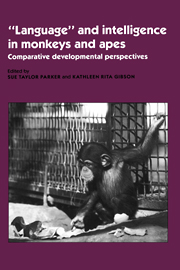Book contents
- Frontmatter
- Contents
- List of contributors
- Foreword
- Preface
- Acknowledgments
- Part I Theoretical frameworks for comparative developmental studies
- Part II Comparative developmental perspectives on cebus intelligence
- 5 The comparative study of cognitive ontogeny in four primate species
- 6 Sensorimotor development in hand-reared and mother-reared tufted capuchins: A systems perspective on the contrasts
- 7 Tool use, imitation, and deception in a captive cebus monkey
- 8 The role of innate motor patterns in ontogenetic and experiential development of intelligent use of sticks in cebus monkeys
- Part III Questions regarding imitation, “language,” and cultural transmission in apes and monkeys
- Part IV Developmental perspectives on social intelligence and communication in great apes
- Part V Development of numerical and classificatory abilities in chimpanzees and other vertebrates
- Part VI Comparative developmental perspectives on ape “language”
- Index
5 - The comparative study of cognitive ontogeny in four primate species
Published online by Cambridge University Press: 11 May 2010
- Frontmatter
- Contents
- List of contributors
- Foreword
- Preface
- Acknowledgments
- Part I Theoretical frameworks for comparative developmental studies
- Part II Comparative developmental perspectives on cebus intelligence
- 5 The comparative study of cognitive ontogeny in four primate species
- 6 Sensorimotor development in hand-reared and mother-reared tufted capuchins: A systems perspective on the contrasts
- 7 Tool use, imitation, and deception in a captive cebus monkey
- 8 The role of innate motor patterns in ontogenetic and experiential development of intelligent use of sticks in cebus monkeys
- Part III Questions regarding imitation, “language,” and cultural transmission in apes and monkeys
- Part IV Developmental perspectives on social intelligence and communication in great apes
- Part V Development of numerical and classificatory abilities in chimpanzees and other vertebrates
- Part VI Comparative developmental perspectives on ape “language”
- Index
Summary
Theoretical perspectives
The comparative study of cognitive ontogeny in primates is a fundamental key to an understanding of both the structure of human cognition and its evolutionary formation. There are two main reasons why the study of development is a privileged avenue to a theory of cognitive capacity. First, it provides a nonarbitrary basis for the identification of cognitive structures. What we commonly call cognition is a highly complex and integrated set of closely interacting systems that is not easy to pull apart. For example, is memory an independent system? Or language? Or attention? Does the capacity to use tools or that to draw inferences and deductions correspond to a specific cognitive mechanism? Judging from the way research practice in this field is divided up (as shown, for example, by the titles of many monographs), one should think so.
On the other hand, considerable evidence indicates that this is not the way cognition is structured. A deeper analysis of those capacities reveals the interaction of a complex set of underlying mechanisms that are called upon and employed in a variety of other functions (e.g., Bever, 1974). In other words, there seems not to be a one-to-one correspondence between overt cognitive capacities and the underlying mechanisms responsible for them. By showing cognitive mechanisms in the process of formation, development helps to bring to light these underlying mechanisms, either because they are not yet integrated in such a complex way or because they are still in the process of differentiation.
Information
- Type
- Chapter
- Information
- 'Language' and Intelligence in Monkeys and ApesComparative Developmental Perspectives, pp. 157 - 171Publisher: Cambridge University PressPrint publication year: 1990
Accessibility standard: Unknown
Why this information is here
This section outlines the accessibility features of this content - including support for screen readers, full keyboard navigation and high-contrast display options. This may not be relevant for you.Accessibility Information
- 7
- Cited by
